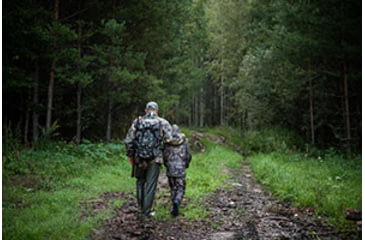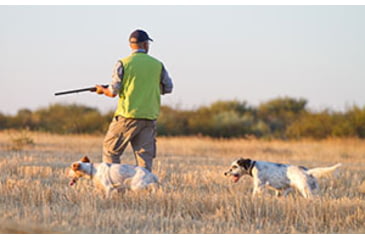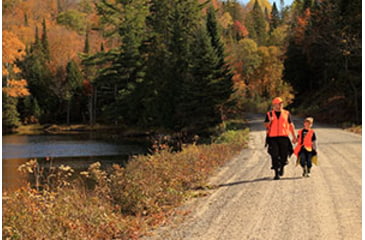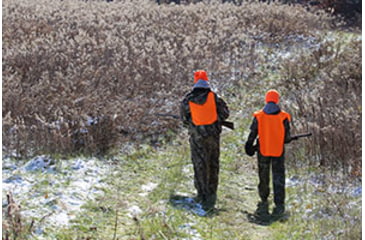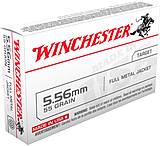 If you’re reading this, you’re probably considering how to start hunting but don’t know where to begin. While modern life pushed hunting to the margins, there are new hunters who are adults that are self-motivated to get into it. This means they’ve put more thought into it than a kid who has their first hunt around 12 years old since that’s just what they grew up around. Hunting has been passed down from generation to generation throughout history. As a result, many hunters were introduced to it in childhood by an older family member, which is still pretty common today. Hunting has seen a resurgence as people become more concerned about where and how their food is sourced, particularly in the “locavore” movement, but not everyone comes from a hunting family. I find the topic of adults getting into hunting very interesting and love to talk to hunters who didn’t start until adulthood so I can pick their brains for motivations, opinions, and impressions. My history with hunting isn’t very remarkable, after all. I tagged along on hunting trips until I was old enough to take my hunter education course, get my hunting license, and start hunting. This is often the case for most experienced hunters. Some drop out when they get older, losing interest after they move on to adulthood. They may go out every few years with family, but they’re not particularly invested. Others catch the fever and never really shake it, poring over Hunting Gear, articles, maps, videos, and hobnobbing over the gun counter in the offseason.
If you’re reading this, you’re probably considering how to start hunting but don’t know where to begin. While modern life pushed hunting to the margins, there are new hunters who are adults that are self-motivated to get into it. This means they’ve put more thought into it than a kid who has their first hunt around 12 years old since that’s just what they grew up around. Hunting has been passed down from generation to generation throughout history. As a result, many hunters were introduced to it in childhood by an older family member, which is still pretty common today. Hunting has seen a resurgence as people become more concerned about where and how their food is sourced, particularly in the “locavore” movement, but not everyone comes from a hunting family. I find the topic of adults getting into hunting very interesting and love to talk to hunters who didn’t start until adulthood so I can pick their brains for motivations, opinions, and impressions. My history with hunting isn’t very remarkable, after all. I tagged along on hunting trips until I was old enough to take my hunter education course, get my hunting license, and start hunting. This is often the case for most experienced hunters. Some drop out when they get older, losing interest after they move on to adulthood. They may go out every few years with family, but they’re not particularly invested. Others catch the fever and never really shake it, poring over Hunting Gear, articles, maps, videos, and hobnobbing over the gun counter in the offseason.![]()
How Do You Start Hunting for Beginners?
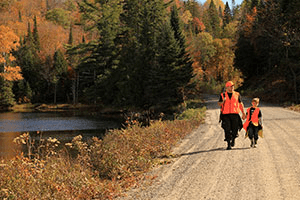 Number one, you’ll probably need to take a hunter education course before getting a hunting license in most states. You can find them through your state’s wildlife management entity, usually called “Fish and Game” although I’ve also seen “Game & Fish” and “Department of Natural Resources”, etc. The easiest way to find them is to search your state’s name and “hunting regulations” and it will come up for you. Even if your state doesn’t require a hunter education course (aka “hunter safety course”), it’s still a good idea to take one for anyone who wants to start hunting. Going out with a friend or family member is a great way to learn, but the objective information you’ll get from a formal course is invaluable. A hunter education course will usually have some sort of online or in-person class time, an exam, and a field day where you physically show up to demonstrate that you know the basics of the information from the hunter safety course that will be part of the class time. The field day doesn’t mean you have to show up as an expert marksman, it is primarily to prove that you understand How to Safely Handle Firearms.
Number one, you’ll probably need to take a hunter education course before getting a hunting license in most states. You can find them through your state’s wildlife management entity, usually called “Fish and Game” although I’ve also seen “Game & Fish” and “Department of Natural Resources”, etc. The easiest way to find them is to search your state’s name and “hunting regulations” and it will come up for you. Even if your state doesn’t require a hunter education course (aka “hunter safety course”), it’s still a good idea to take one for anyone who wants to start hunting. Going out with a friend or family member is a great way to learn, but the objective information you’ll get from a formal course is invaluable. A hunter education course will usually have some sort of online or in-person class time, an exam, and a field day where you physically show up to demonstrate that you know the basics of the information from the hunter safety course that will be part of the class time. The field day doesn’t mean you have to show up as an expert marksman, it is primarily to prove that you understand How to Safely Handle Firearms.
Can You Teach Yourself to Hunt?
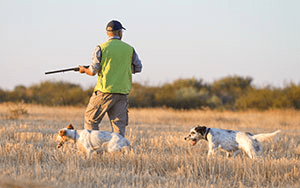 After you get the Hunter Education Course completed and have your hunting license, you can definitely teach yourself to hunt. This will involve researching the wild game you’re after, including habitats and habits. You’ll find yourself reading a lot of articles that are more in-depth than this one and usually specific to certain animals and types of hunting. There is a lot of information out there, and since hunters tend to be a friendly lot that enjoy sharing knowledge, most of what you find will be valuable and insightful. Don’t get discouraged if you make mistakes. There is a lot of trial-and-error in learning to hunt, and nobody knows everything about anything. Any honest hunter will tell you that they still flub it up from time to time, even after a lifetime of hunting. You’ll pretty easily pick up what you did wrong and know how to correct that next time. Just make sure you get back out there and try again. When in doubt, don’t do it. It may be unethical or even illegal. If you have any questions in your mind about something you’re about to do while hunting, then you’d better be darn sure before you carry on and go through with it.
After you get the Hunter Education Course completed and have your hunting license, you can definitely teach yourself to hunt. This will involve researching the wild game you’re after, including habitats and habits. You’ll find yourself reading a lot of articles that are more in-depth than this one and usually specific to certain animals and types of hunting. There is a lot of information out there, and since hunters tend to be a friendly lot that enjoy sharing knowledge, most of what you find will be valuable and insightful. Don’t get discouraged if you make mistakes. There is a lot of trial-and-error in learning to hunt, and nobody knows everything about anything. Any honest hunter will tell you that they still flub it up from time to time, even after a lifetime of hunting. You’ll pretty easily pick up what you did wrong and know how to correct that next time. Just make sure you get back out there and try again. When in doubt, don’t do it. It may be unethical or even illegal. If you have any questions in your mind about something you’re about to do while hunting, then you’d better be darn sure before you carry on and go through with it.
What Are the Steps of Hunting?
 Here are the basics to start hunting for the first time:
Here are the basics to start hunting for the first time:
- Take a hunter education course/hunter safety course long before hunting season starts.
- If you procrastinate, you’ll probably have to wait for the next year’s hunting season.
- Be sure you check and understand your local hunting regulations before you go out.
- Know where you’re going to hunt.
- There can be a lot of hunting opportunities on public land, but that means it can be more crowded with other hunters.
- Hunting on private land typically means fewer hunters, but you have to have permission before hunting land that doesn’t belong to you. Get the landowner’s permission a month or two before hunting season starts, and offer to help them out around the property with chores or share some of your harvest.
- Scout the land as much as possible before opening day. If you live far away from your hunting land, use online maps to look for vehicle access points, trails, and animal habitats (food and water sources, cover, etc.). When scouting online, especially in mountainous regions, it’s a best practice to turn on the topographical map or filter so you know what kind of terrain you’re going to be contending with.
- Make sure you get the proper hunting license for the wild game species you’re going after and the hunting method/weapon you’ll be using.
- This may require archery permits for bowhunting, Muzzleloader permits for blackpowder, and other validations.
- All waterfowl hunting in the United States requires a Duck Stamp per federal law. This applies not only to ducks but also to geese, swans, cranes, snipe, etc.
Some states may require a federal Duck Stamp for migratory birds that aren’t waterfowl, like mourning doves, and others may just charge a state fee. - You will usually need a tag when you’re going big game hunting, like elk, whitetail, or mule deer hunting. If you’re doing a draw hunt, which is a lottery system, be sure to apply before the draw date, or you’ll miss out.
- Make sure your weapon is field-ready.
- An ethical kill is of the utmost importance in any hunting, starting with having the appropriate weapon.
- Again, check your local hunting regulations to ensure your weapon is legal and appropriate for the wild game you’re going after.
- If you’re going bowhunting, take your Archery & Bowhunting Gear to a local archery shop to have it inspected and tuned before you go out.
- When hunting with a firearm, make sure it’s clean.
Ensure your ammo is legal, as some places and game species require certain ammo. For example, federal law requires nontoxic shotgun ammo for all waterfowl.
If you’re using a scoped rifle, make sure it’s properly zeroed prior to taking it out in the field. - Practice, practice, practice.
No matter what kind of hunting you’re doing, practice plenty before going afield. Build up your confidence so that you know when the moment comes down and it’s time to take the shot, you have the baseline skills to make a clean, ethical kill.
Shop for Hunting Gear at OpticsPlanet!
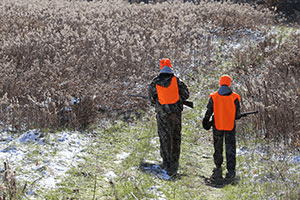 Check out our Hunting Store for everything you need to get started, or to replace those old hand-me-downs odds and ends with new gear. You’ll find a huge variety of Ammo to ensure you have plenty of practice time at the range and a good supply for your first hunt. Browse the rest of the library of Hunting Gear Guides from our in-house experts if you’d like to learn more, too. Happy hunting!
Check out our Hunting Store for everything you need to get started, or to replace those old hand-me-downs odds and ends with new gear. You’ll find a huge variety of Ammo to ensure you have plenty of practice time at the range and a good supply for your first hunt. Browse the rest of the library of Hunting Gear Guides from our in-house experts if you’d like to learn more, too. Happy hunting!
